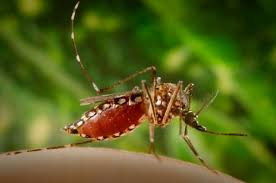How pesticides can increase mosquito numbers
The blood suckers evolve resistance, but their predators don't, according to a new study in Costa Rica
By Jake Buehler
PUBLISHED
INSECTICIDES IN AT least one area are not only failing to control mosquitoes, new research suggests, they’re actually allowing the blood-sucking pests to thrive—by killing off their predators.
The study, published this month in the journal Oecologia, reveals a new wrinkle in how insecticides may be impacting ecosystems. Mosquitoes in the study area in Costa Rica have evolved resistance to common chemicals meant to kill them and other pests. The mosquitoes’ predators, meanwhile, have not kept pace with that evolution—and that has allowed the mosquito population to boom.
Edd Hammill, an ecologist at Utah State University and lead author of the study, first got an inkling that insecticides might not be having their intended effect while conducting research in orange plantations in northern Costa Rica.
“We felt like we were getting a lot more mosquito bites in plantations than in pristine areas and started to wonder why,” Hammill says.
So he and his team surveyed where the mosquitoes were coming from: bromeliads, a group of plants found in warm parts of the Americas, often growing on tree branches. The water-filled spaces between their tightly overlapping leaves host a whole community of insect larvae, including mosquitoes of the species Wyeomyia abebela.
The team looked at bromeliads in plantations—some of which had been treated with insecticides for more than twenty years—and in untreated forests. The Costa Rican growers use dimethoate to treat their orange trees for plant lice, but it kills many other insect species too. In the U.S. it’s widely used on citrus, corn, and other crops.
When the researchers took the insects into the lab and exposed them to varying levels of dimethoate, they found that the plantation mosquitoes tolerated concentrations ten times higher than the forest mosquitoes. But the plantation damselflies had evolved no such resistance.
The resistant mosquitoes thus appear to have found a sweet spot: a nursery habitat for their young that is devoid of predatory damselflies. There, they flourish.
A worldwide trend
For insect ecologist Don Yee of the University of Southern Mississippi, who was not involved with this study, the findings fit into a larger story: the ongoing difficulty managing mosquito populations. Resistance to the major groups of insecticides is already widespread around the world. It’s of particular concern in the case of mosquito species that spread dangerous illnesses.
Recent Posts
-
Dengue fever deaths surge in Caribbean and Americas due to climate crisis
Warmer weather brought on by climate crisis enables mosquitoes that carry virus to expand their reac …12th Dec 2024 -
5 Benefits of Using Bed Canopy Mosquito Nets for Your Bedroom | MosquitoNets.com
5 Benefits of Using Bed Canopy Mosquito Nets for Your BedroomLooking for a simple yet elegant solut …20th Nov 2024 -
Novel way to beat dengue: Deaf mosquitoes stop having sex
Scientists believe they have found a quirky way to fight mosquito-spread diseases such as dengue, ye …7th Nov 2024




